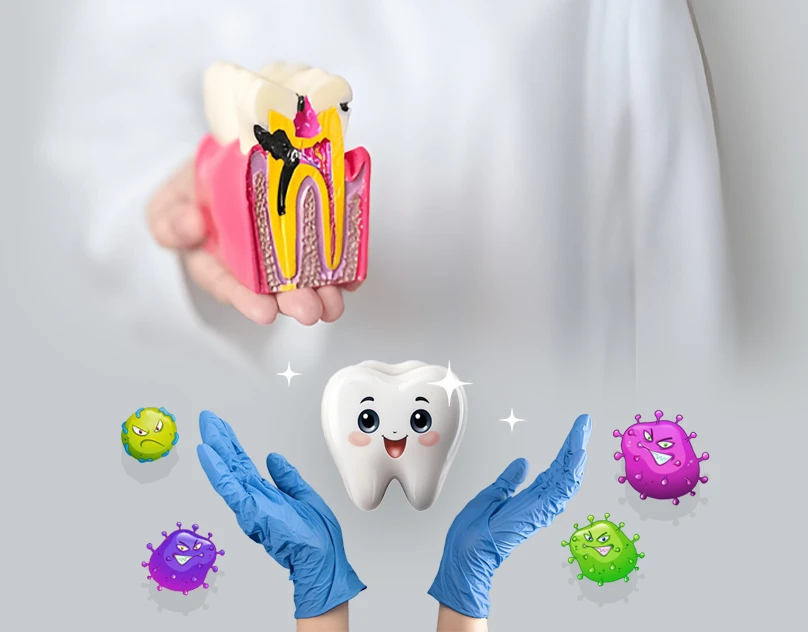

How to Prevent Cavities and Protect Health of Your Teeth
Cavities, also a dental caries with tiny holes. They are responsible to form in the teeth, leading to pain, infection, and even tooth loss in extreme cases, if left untreated. While act of brushing and flossing are a must, preventing condition such as cavities can go much deeper. This shall also involve a combination of daily habits, dietary choices, and even an understanding of unique genetic predispositions.
The Science Behind Cavities: How They Form
Right from effectively preventing cavities, it is well crucial to understand how they might develop. It is a tug-of-war between the mouth and the tooth. With a constant battle right between those factors which shall protect the teeth and those decay.
- Bacteria and Sugar: Learn that your mouth is a sweet little home to millions of bacteria out there. Hence, when you consume sugary or starchy foods and drinks, these bacteria are on feast and thus they produce acids.
- Acid Attack: Such acids attack tooth enamel, which is the hard, protective outer layer of your teeth. With time these keep on repeating acid attacks which eventually causes the enamel to lose minerals. This entire chain process is called demineralization.
- Plaque Formation: Elements like bacteria, food particles, acid, and saliva altogether combine to form a sticky film known as plaque. This plaque adheres to teeth, trapping acids and making it harder for the saliva to neutralize them.
- Cavity Development: If this ongoing process continues without intervention, the enamel shall weaken and eventually break down. This act can lead to the formation of a cavity. This is a small hole in your tooth.
Essential Steps to Prevent Cavities
Preventing some cavities is a lifelong commitment. However, the good news is that many effective strategies are within your complete control.
Master The Oral Hygiene Routine
This is the cornerstone with reference to a specific set of cavity prevention.
- It is Healthy To Brush Twice A Day, Make Sure to Use Fluoride Toothpaste:
- Brush for approx. two minutes, ideally post intake of every meal or at least twice a day (in the morning after waking up and before going to bed).
- Make use of a soft-bristled toothbrush.
- Fluoride, as a natural mineral strengthens enamel of the tooth. This makes it resistant to acid attacks. This can also be reversed at the early stage of tooth decay. Ensure to use toothpaste that contains approx. 1000 ppm of specific fluoride.
- For 3 to 6 years old children, make use of a pea-sized toothpaste. Younger children need proper supervision to ensure they do not swallow it more.
- Floss Daily: Act of brushing can alone reach all the food particles. But plaque which is well nestled between teeth or under those gumline. Making sure to floss once a day is highly important for cleaning these hard-to-reach areas.
- Consider Mouthwash: Considering an antibacterial or fluoride mouthwash provides an extra layer of protection which mouth and tooth shall need. This does the job by lowering bacteria and helping to re-mineralize enamel. On the other hand, it is generally not recommended for children under 6 years old to prevent accidental swallowing of the same.
Make Smart Dietary Choices
What you eat and drink directly impacts your cavity risk.
- Limit Intake of Sugary and Starchy Foods and Drinks: Every time you use sugar or starch, you might feed the cavity-which leads the bacteria in your mouth to produce acid.
- Lowered Frequency:
It is not just about the amount of sugar, but also how often you shall consume it. Constant snacking or simply sipping on sugary drinks can keep your teeth under continuous acid attack. Hence, as a solution try to limit sugary treats to mealtimes.
- Calculate Sugar Level:
Many packaged foods, cereals, and even seemingly healthy drinks including fruit juice contain high amounts of sugar. Make sure you read all the labels on the packages carefully.
- Avoid Sugary Drinks in Baby Bottles:
Make sure that you never put sweet drinks in a baby’s bottle or allow a child to sleep with a bottle.
Choose From the List Of Tooth-Healthy Foods:
- Fresh Fruits and Vegetables:
They help in stimulating saliva flow. This further helps to neutralize acids and wash away food particles. Crunchy options like apples and carrots. They can act like a natural tooth scrubber.
- Dairy Products: Milk, cheese, and yogurt are known to be excellent sources of calcium and phosphorus. They can all help in strengthening tooth enamel.
- Water: Consuming plenty of water, especially fluoridated tap water, as it is highly beneficial. Learn that water washes away food particles and all the acids present in the mouth and on the teeth. Many public water supplies are fluoridated, significantly lowering those tooth decay rates.
- Sugar-Free Gum: Chewing sugar-free gum post meals can enhance saliva production. This in turn can help in neutralizing acids and it can also clean your teeth. You are to look for gums that have xylitol. This has been shown to lower those harmful bacteria.
Regular Dental Check-ups and Professional Care
- Twice-Yearly Dental Exams and Cleanings: Performing some of the regular check-ups can allow the dentist to spot early signs of decay right before they become major issues.
Taking help of Professional cleaning can remove plaque and tartar buildup which regular brushing fails.
- Dental Sealants: They are thin, plastic coatings which are applied to the chewing surfaces of the back teeth (which are the molars and premolars). Such surfaces might have deep grooves and some pits. Sealants are to create a barrier, which shall be about protecting the enamel from decay.
- Fluoride Treatments: If your dentist determines you to have a high risk of cavities, they shall also recommend some professional fluoride treatments, like gels or varnishes. Getting a great prescription-strength fluoride toothpaste or mouth rinse can help.
The Role of Genetic Testing in Cavity Prevention
While those regular habits and diet are critical, emerging research highlights that your genetics can also play a significant role in susceptibility to cavities.
Understanding these genetic components can empower you with a personalized approach towards, how to prevent cavities.
How Genetics Influence Cavity Risk:
- Strength and Structure of Enamel: Genes are to blame for influencing the formation and strengthening of tooth enamel. Some of the individuals might also have naturally weaker enamel. This makes the teeth vulnerable to components like acid erosion and decay. They can even help with good oral hygiene.
For example, conditions namely, amelogenesis imperfecta, a hereditary disorder, directly impact enamel development.
- Saliva Composition and Flow It:
As a natural defense mechanism, Saliva neutralizes acids and ads in remineralization. Genetic factors can all affect the quantity and quality of the saliva. It might include the presence of protective proteins. On the other hand, individuals with genetically lower salivary flow or altered saliva composition might be at a higher risk of attaining cavities.
- Oral Microbiome: The mouth’s unique bacterial community, or any sort of oral microbiome, is well influenced by genetics. Some of these genetic predispositions can further lead to a higher prevalence of harmful bacteria. They are to produce acid and promote quick decay like condition.
- Tooth Shape and Alignment: Shape and alignment of the teeth are largely determined, genetically. Crowded or misaligned teeth can be super challenging to clean effectively. They shall increase areas where plaque can accumulate well.
What Genetic Testing for Cavities Involves:
Genetic testing for that dental health shall involve analysing your DNA with precision. They can typically from a saliva sample or buccal (cheek) swab, help to identify specific genetic markers. These markers are well linked to an enhanced risk of dental issues like cavities. Some of these tests shall aim to provide insights into your predispositions related to:
- Enamel quality
- Saliva protective factors
- Immune response to oral bacteria
- Composition of your oral microbiome
It is important to understand that genetic testing can help in providing a probabilistic assessment of risk. They are not only about a definitive diagnosis of future cavities. It is also about one piece of the puzzle that, when combined with your lifestyle, diet, and oral hygiene practices. They altogether offer a complete picture of dental health profile. The field of genetic testing for oral health is continually evolving, with ongoing research improving understanding of some gene-environment interactions.
Take Control of Your Dental Health with Lifecode
Understanding your genetic blueprint can reveal important clues about your risk for certain health issues, including dental problems like cavities. Genetic testing for dental health, offered by LifeCode, provides personalized insights by analyzing specific genes related to enamel strength, saliva composition, and the oral microbiome. LifeCode focuses on giving people the tools they need to take control of their health through accurate and reliable DNA testing powered by advanced sequencing technology.
By identifying key genetic markers, LifeCode helps you and your dentist create a personalized plan to prevent cavities. This proactive approach allows for smarter lifestyle choices and targeted dental care, going far beyond the typical one-size-fits-all solution.

Can You Inherit Migraine Risk The Truth About Women’s Brain Health
Can You Inherit Migraine Risk The Truth About Women’s Brain Health The Genetic Link to Migraines, It Is More Than Just Bad Luck Why Women are More...


Unlocking Your Body’s Blueprint: Genetic Clues to Pregnancy Complications and Hypertension
Unlocking Your Body's Blueprint: Genetic Clues to Pregnancy Complications and Hypertension The Intricate Dance of Genes and Health Decoding Pregnancy Complications Through Genetics The Genetic Roots of...

Education: Bachelor of Pharmacy (B.Pharm) from the Tata Institute of Social Sciences (TISS), Mumbai Experience: Agarwal is a seasoned pharmacist with over 7 years of experience in the pharmaceutical field. She has worked in various settings, including hospital pharmacies and community clinics, where she has excelled in medication management, patient counseling, and clinical support. Agarwal is known for her expertise in drug therapy optimization and patient safety. In addition to her practical experience, she contributes to health journalism, focusing on pharmaceutical advancements and health policy, and is involved in research projects aimed at improving medication practices and health outcomes. is known for her expertise in drug therapy optimization and patient safety. In addition to her practical experience, she contributes to health journalism, focusing on pharmaceutical advancements and health policy, and is involved in research projects aimed at improving medication practices and health outcomes.


